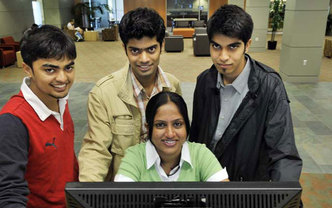 In my previous blog, I laid out the problem of employability in India for technical students and why this problem is far more prevalent for young women. Between 60-80% of technical graduates are considered "not employable" because they lack the "soft skills", the gap between the knowledge-based skills and the skills that would make them successful in industry. Each year, hundreds of thousands of students defined as "not employable" are unable to find careers in technology upon graduation. Government, most academic institutions and industry see this as a "fact of life" and have done little, if anything, to address this waste of talent and the impact it has on the individual, their families, community and society. In this blog, I will address: what do we mean by "soft skills"? Why are these skills important qualities for a "fresher" (new recruit)? Finally, what can be done to resolve the employability problem both short and long term?  The "soft skills" often mentioned as lacking for technical college graduates in India, is broken down into 5 major areas: 1. Communication skills - the ability to read and write in English in a professional manner. 2. Experience with large data sets. Most students do not work on actual projects until their 4th (Senior) year of college. This limited experience is not sufficient, the data sets are not large enough and the projects are outdated and no longer relevant (i.e. a basic database with a few fields and a few hundred lines of code versus data sets with millions of lines of code, terabytes of data and exposure to different data configurations required for todays technology worker). 3. Experience working in teams. Industry needs students who have experience working in cross-functional teams. Experience with virtual and global teams would be ideal. 4. Analytical thinking - the ability to read reports, understand outcomes and synthesize the relevant data/facts in order to make a recommendation. 5. Exposure to industry - have a clear understanding of what a job in industry is like upon graduation. Ability to understand relevant nomenclature and gain relevant experience while in class using standard tool-sets and programs considered the norm in industry. Without these skills, new graduates cannot succeed in attaining a job or being productive in industry. What can be done to solve these major challenges? There is something all of us can do:Long Term: (these will take awhile, but are necessary) 1. We must work together to change the curriculum. There are a few groups who are trying to address this but as anyone who works with the government in India knows, this is not going to happen anytime soon. It will require a joint partnership between academia, industry and the global community to bring this curricula up to date. 2. All engineering colleges need to be "Accredited" or they are no longer in business. Government should clamp down on the certification process assuring the curriculum being taught and the teachers who are delivering the content are expert and will give every student the best chance of success. There are plenty of models the Indian government can look at. This process should be paid for by the academic institutions it certifies. 3. Government should require all colleges and universities to collect and post employment statistics after graduation. Every graduating class should report back to the institution from where they graduated their employment status at the end of 6 months and 1 year. This data should be available on the internet and given to all perspective students (and their parents) BEFORE they are admitted into the institution. Here is an example of what each college and university should be reporting. Short-Term (these can happen right now and YOU can make them happen) 4. Get the word out. Talk to your friends, colleagues, family and community about this problem. Awareness seems to be lacking and it is awareness that will bring the first step towards solutions. Please post here in the comments section about your findings. Were people aware? What do they see as potential solutions? Do you know of someone who is "not employable"? We would be very interested in their story. 5. Mentor a student. If you are in industry, ask your alma mater or a local engineering college if you can mentor a student. There are a number of organizations who are mentoring students and Global Tech Women will be offering a mentoring program in partnership with Cloud Mentor shortly. If you are interested in helping out, please contact us. 6. Work with your organization to adopt a school. Ask your company to partner with a local engineering college...how about a women's engineering college? Have your technical women's group reach out to the university and partner with a the teachers and a class of students. Offer to visit, tutor and mentor their students. Work with the college to find tools and projects that are meaningful and indicative of what a student will face in industry. If you need help making these connections, contact us. 7. Speak at a local college. Offer your expertise to a local engineering college. Meet with the students and help them learn where to find resources and help them explore their next steps. I know they would be thrilled to meet you as they are when I visit them. Bring small items from your organization to get them excited about the possibility of working in industry! 8. Ask your recruiting team at your organization to help. Ask them to visit the local college and meet with academics and explain the hiring criteria. Partnering with the local engineering college, providing internships and assisting them to shore-up the curriculum will lead to better employment successes. What are the areas you feel I have missed in this post that would aid students in becoming more employable? What ideas do you have to help? Who else should be helping? What organizations do you know who are working on these issues? Together we can make a difference. Please sign up for our newsletter as we explore in more depth how Global Tech Women will be working towards resolution on this very important issue. This is just the beginning of the conversation! Let's change the trajectory to that of students who are prepared and ready to change the world of technology - and their communities.
0 Comments
Leave a Reply. |
|

 RSS Feed
RSS Feed